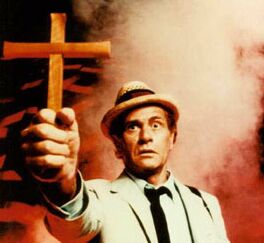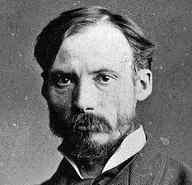from
Kolchak:

A few months ago, handdrummer asked me to write something about the attempt to resurrect The Night Stalker television show on ABC. I started to think about how this watered-down, prettied-up version of Kolchak could be taken as the most bizarre monster the original had ever faced. Before I could write anything, though, the new series was put out of our misery.
But it looks like I’m going to be writing about Kolchak after all. Darren McGavin, the actor who originated the role, died on Feb. 25, at age 83.
McGavin is probably best known to modern audiences as Ralphie’s Old Man in the 1983 movie A Christmas Story. He made hundreds of television and movie appearances, however, and, for a lot of us, he will always be associated with Carl Kolchak, the down-but-never-out newspaper reporter who fought relentlessly to bring stories about supernatural menaces to the public.
Kolchak was introduced in a 1972 made-for-TV movie called -- you guessed it--The Night Stalker. Based on a story by a journalist named Jeff Rice, the movie tells the story of how Kolchak discovers a vampire in modern-day Las Vegas. He defeats the vampire but learns he can’t defeat the politicians and business men who run Vegas.
The movie garnered the highest ratings of any made-for-television film up to that point. Horror Veteran Richard Matheson, who adapted Rice’s story, and Producer Dan Curtis made substantial contributions to the first movie’s success, of course.
But it’s hard to underestimate McGavin’s performance as Kolchak. Dressed in a well-worn seersucker suit-- the last suit he owned, according to McGavin-- Kolchak immediately became an iconic character-- hard-boiled, yet devoted to uncovering the truth. He was a spiritual descendent of Hildy Johnson, the lead character in The Front Page. (For years, I thought McGavin must’ve appeared in a production of The Front Page, in order to inhabit Kolchak so quickly and so thoroughly. But all the credit lists I’ve read say he didn’t. He did go on to play other journalists though , including E.K. Hornbeck, --who was based on H.L. Mencken-- in a 1988 production of Inherit the Wind.)
The Night Stalker was followed by a second movie, The Night Strangler, in 1973. It didn’t make as big of a splash as the original, but McGavin’s style--and his relationship with Editor Tony Vincenzo (Simon Oakland)-- made the sequel popular. A third movie-- The Night Killers -- was scripted, but was never produced. Instead, ABC went for a television series in 1974.
Many talented people were involved withthe show; along with McGavin and Oakland, there were writers David Chase (The Sopranos), Bob Gale and Robert Zemeckis (Back to the Future) and actors who would go on to star in other series. However, they never did come up with a reliable way to deal with budgetary problems and problems with what tone the series should have. It was canceled after 20 episodes (FWIW, last fall’s trainwreck, er, attempted revival, lasted nine episodes, although 12 were produced.)
That should’ve been the end of Carl Kolchak. Only it wasn’t. The TV episodes enjoyed a second life in a late-night slot on CBS (this was well before David Letterman took over that position.) Now they’re running four or five a time, once every month or so, during the day on the Sci-Fi Channel (who will also be running the newer episodes, sometime this summer.) McGavin’s adventures have collected onto a DVD set, while new adventures, using his interpretation of the character are being published by Moonstone Books. Most of these stories are in comic book form, but Moonstone also released an anthology of text “Night Stalker” stories late last year.
Kolchak has made himself known in other ways, too. Chris Carter, creator of The X Files , regularly said in interviews that he was heavily influenced by The Night Stalker. Carter and his creative staff formally acknowledged that influence when McGavin appeared on two episodes of The X Files as Arthur Dales, the first FBI agent to be formally assigned to the X Files section.
The first of these episodes, 1998’s “Travelers,” is definitely worth looking for. Most of it is a flashback set in the 1950s, with a younger actor playing Dales, but McGavin appears in a framing sequence and narrates the flashback. This was a particularly elegant approach, because it suggested the format of the original TV show and it allowed McGavin to use one of his strongest acting tools, his distinctive raspy voice.
Another post-Kolchak performance of McGavin’s that you should check out is Mastergate, a political satire by Larry Gelbart made in 1992, where he appears as Sen. Fulsom Bunting.
Public awareness of Kolchak may have waxed and waned, but he was always part of my personal pantheon of heroes and heroines. In the late 1970s and early ‘80s, I was part of a committee--led by our esteemed handdrummer--who put on an annual science fiction convention in Central Pennsylvania. For the costume call at that first convention, I managed to cobble together a recognizable facsimile of Kolchak’s distinctive suit. The suit is long gone, but we still have a photo of me in costume, interviewing another convention goer, dressed as Dr. Frank N. Further, from The Rocky Horror Picture Show.
And from time to time, at later editions of the convention, people I would be talking with would pause and says something like, “Oh, yeah, you were the one dressed like Kolchak.” And I know it wasn’t because it was such a professional-looking costume...
I think I still have a copy of a fan fiction vignette I wrote where JackMagee, the reporter who pursued the Hulk through his television incarnation, went to a retired Kolchak for help.
When Gordie “The Ghoul” Spangler (John Fiedler) appeared on the television show as a Chicago morgue attendant, I immediately started to refer to him as Uncle Gordie. I sold an article about The Night Stalker to a nationally circulated magazine called Xpose. And when handdrummer recruited me for the Blatt, he suggested Kolchak as my nom du screen.
Why has Kolchak stayed with me over the years (hell, decades)? I’ve been thinking about that a lot over the last few days, since I learned that McGavin had been hospitalized and was considered “gravely ill.” The answers aren’t particularly original, but here they are:- Kolchak combined two of my strongest interests: journalism and fantastic literature (I’m including science fiction, horror and fantasy here, although Kolchak’s adventures were primarily horror.)
- And he was a role model for aspiring journalists (though I’m not sure the phrase “role model” even existed in the early1970s.) While he usually scored a victory over the Monster of the Week, he almost never triumphed over the bureaucratic or political power structure of the modern world. He was never a success by the criteria most people would use to define the word. He was considered a pariah on many levels of society. But that never stoppedhim from getting the story. The Night Stalker was primarily about the supernatural, but it was definitely about journalism too.
And I know I’m not the only writer who feels this way. Mark Dawidziak, who has written extensively about the character, tells this story in his book, The Night Stalker Companion:
Crossing a newsroom several years ago...I saw one of the newspaper’s finest reporters waving his arms in a manner that suggest a condition somewhere between outrage and apoplexy....
“This,” the indignant reporter shouted as he waved a late edition under the editor’s nose, “is a newspaper. We are a newspaper! We are supposed to print the news!”
If the delivery had not been letter perfect, the lightbulb might never have reached the illumination stage. But I realized he was borrowing Carl Kolchak’s fiery tirade to editor Tony Vincenzo in The Night Stalker.
I got it and couldn’t resist saying so.
“You’re right,” he said, all smiles...”You’re the first one who got it. ...I always thought that Kolchak was the closest television ever came to capturing a true reporter.”
When the original series first appeared, my friends and I used to talk about how there had to be some sort of reason why Kolchak encountered all these supernatural beings. Now, though, I find that a rationale that explained Kolchak’s adventures isn’t as important as it used to be. That’s just the way things were in his world. But it never stopped him. He just kept coming. Maybe that’s why I still think about him.
Darren McGavin left us a large and impressive body of work, but my favorite will
always be Carl Kolchak.















 The unmasking of covert CIA officer Valerie Plame Wilson by White House officials in 2003 caused significant damage to U.S. national security and its ability to counter nuclear proliferation abroad,
The unmasking of covert CIA officer Valerie Plame Wilson by White House officials in 2003 caused significant damage to U.S. national security and its ability to counter nuclear proliferation abroad, 






